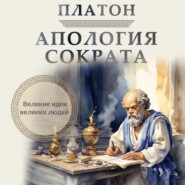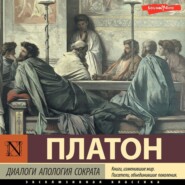По всем вопросам обращайтесь на: info@litportal.ru
(©) 2003-2024.
✖
Cratylus
Настройки чтения
Размер шрифта
Высота строк
Поля
HERMOGENES: With all my heart; for am very curious to hear the rest of the enquiry about names.
SOCRATES: Then let us proceed; and where would you have us begin, now that we have got a sort of outline of the enquiry? Are there any names which witness of themselves that they are not given arbitrarily, but have a natural fitness? The names of heroes and of men in general are apt to be deceptive because they are often called after ancestors with whose names, as we were saying, they may have no business; or they are the expression of a wish like Eutychides (the son of good fortune), or Sosias (the Saviour), or Theophilus (the beloved of God), and others. But I think that we had better leave these, for there will be more chance of finding correctness in the names of immutable essences; – there ought to have been more care taken about them when they were named, and perhaps there may have been some more than human power at work occasionally in giving them names.
HERMOGENES: I think so, Socrates.
SOCRATES: Ought we not to begin with the consideration of the Gods, and show that they are rightly named Gods?
HERMOGENES: Yes, that will be well.
SOCRATES: My notion would be something of this sort: – I suspect that the sun, moon, earth, stars, and heaven, which are still the Gods of many barbarians, were the only Gods known to the aboriginal Hellenes. Seeing that they were always moving and running, from their running nature they were called Gods or runners (Theous, Theontas); and when men became acquainted with the other Gods, they proceeded to apply the same name to them all. Do you think that likely?
HERMOGENES: I think it very likely indeed.
SOCRATES: What shall follow the Gods?
HERMOGENES: Must not demons and heroes and men come next?
SOCRATES: Demons! And what do you consider to be the meaning of this word? Tell me if my view is right.
HERMOGENES: Let me hear.
SOCRATES: You know how Hesiod uses the word?
HERMOGENES: I do not.
SOCRATES: Do you not remember that he speaks of a golden race of men who came first?
HERMOGENES: Yes, I do.
SOCRATES: He says of them —
'But now that fate has closed over this race They are holy demons upon the earth, Beneficent, averters of ills, guardians of mortal men.' (Hesiod, Works and Days.)
HERMOGENES: What is the inference?
SOCRATES: What is the inference! Why, I suppose that he means by the golden men, not men literally made of gold, but good and noble; and I am convinced of this, because he further says that we are the iron race.
HERMOGENES: That is true.
SOCRATES: And do you not suppose that good men of our own day would by him be said to be of golden race?
HERMOGENES: Very likely.
SOCRATES: And are not the good wise?
HERMOGENES: Yes, they are wise.
SOCRATES: And therefore I have the most entire conviction that he called them demons, because they were daemones (knowing or wise), and in our older Attic dialect the word itself occurs. Now he and other poets say truly, that when a good man dies he has honour and a mighty portion among the dead, and becomes a demon; which is a name given to him signifying wisdom. And I say too, that every wise man who happens to be a good man is more than human (daimonion) both in life and death, and is rightly called a demon.
HERMOGENES: Then I rather think that I am of one mind with you; but what is the meaning of the word 'hero'? (Eros with an eta, in the old writing eros with an epsilon.)
SOCRATES: I think that there is no difficulty in explaining, for the name is not much altered, and signifies that they were born of love.
HERMOGENES: What do you mean?
SOCRATES: Do you not know that the heroes are demigods?
HERMOGENES: What then?
SOCRATES: All of them sprang either from the love of a God for a mortal woman, or of a mortal man for a Goddess; think of the word in the old Attic, and you will see better that the name heros is only a slight alteration of Eros, from whom the heroes sprang: either this is the meaning, or, if not this, then they must have been skilful as rhetoricians and dialecticians, and able to put the question (erotan), for eirein is equivalent to legein. And therefore, as I was saying, in the Attic dialect the heroes turn out to be rhetoricians and questioners. All this is easy enough; the noble breed of heroes are a tribe of sophists and rhetors. But can you tell me why men are called anthropoi? – that is more difficult.
HERMOGENES: No, I cannot; and I would not try even if I could, because I think that you are the more likely to succeed.
SOCRATES: That is to say, you trust to the inspiration of Euthyphro.
HERMOGENES: Of course.
SOCRATES: Your faith is not vain; for at this very moment a new and ingenious thought strikes me, and, if I am not careful, before to-morrow's dawn I shall be wiser than I ought to be. Now, attend to me; and first, remember that we often put in and pull out letters in words, and give names as we please and change the accents. Take, for example, the word Dii Philos; in order to convert this from a sentence into a noun, we omit one of the iotas and sound the middle syllable grave instead of acute; as, on the other hand, letters are sometimes inserted in words instead of being omitted, and the acute takes the place of the grave.
HERMOGENES: That is true.
SOCRATES: The name anthropos, which was once a sentence, and is now a noun, appears to be a case just of this sort, for one letter, which is the alpha, has been omitted, and the acute on the last syllable has been changed to a grave.
HERMOGENES: What do you mean?
SOCRATES: I mean to say that the word 'man' implies that other animals never examine, or consider, or look up at what they see, but that man not only sees (opope) but considers and looks up at that which he sees, and hence he alone of all animals is rightly anthropos, meaning anathron a opopen.
HERMOGENES: May I ask you to examine another word about which I am curious?
SOCRATES: Certainly.
HERMOGENES: I will take that which appears to me to follow next in order. You know the distinction of soul and body?
SOCRATES: Of course.
HERMOGENES: Let us endeavour to analyze them like the previous words.
SOCRATES: You want me first of all to examine the natural fitness of the word psuche (soul), and then of the word soma (body)?
HERMOGENES: Yes.
SOCRATES: If I am to say what occurs to me at the moment, I should imagine that those who first used the name psuche meant to express that the soul when in the body is the source of life, and gives the power of breath and revival (anapsuchon), and when this reviving power fails then the body perishes and dies, and this, if I am not mistaken, they called psyche. But please stay a moment; I fancy that I can discover something which will be more acceptable to the disciples of Euthyphro, for I am afraid that they will scorn this explanation. What do you say to another?
HERMOGENES: Let me hear.
SOCRATES: What is that which holds and carries and gives life and motion to the entire nature of the body? What else but the soul?
HERMOGENES: Just that.

















